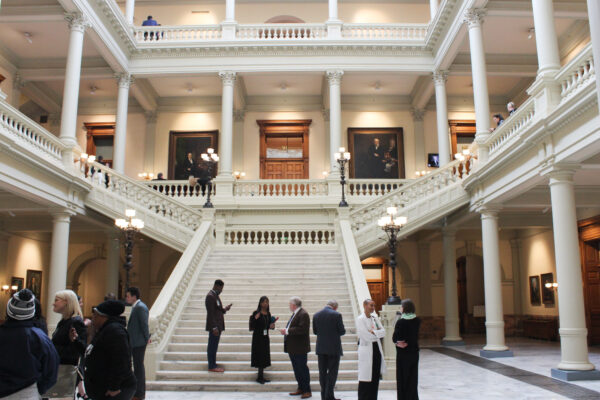Georgia lawmakers have introduced several anti-voting bills, ultimately aimed at making it harder for people to have their voices heard during future elections. We oppose these bills because steps should be taken to make it easier to vote in Georgia, not harder.
The Senate Ethics Committee met Monday evening for a hearing and testimony on SB 222. Our Senior Policy Counsel and Deputy Policy & Advocacy Director, Vasu Abhiraman, was on hand to speak out against its passage.
Simply put, the bill would ban private donations to elections offices; officials will have even fewer resources to draw from.
Abhiraman told the committee that elections offices are starved for funding. He noted that last year, the Georgia Legislature blessed the idea of private money donations to local police departments and created a costly tax credit to support it. Now, those same lawmakers want to ban similar donations to overworked and under-resourced elections offices.
“Elections are expensive and our local election officials serve on the frontlines of our democracy. They deserve the same ability to accept donations as local law enforcement. We call on the legislature to fund our elections, instead of cutting off the resources that fuel our democracy,” Abhiraman said.
The Ethics Committee passed SB 222 despite our opposition.
The fight against anti-voting bills continued Tuesday afternoon when a coalition of voting rights organizations held a virtual press conference. Advocates – including the ACLU of Georgia, Common Cause Georgia, Fair Fight Action, and Progress Georgia – discussed Senate Bill 221 with the media and touched on the need for legislation that supports county election officials statewide.
“Underlying (SB 221) is a perpetuation of a false narrative and an attempt to disenfranchise a subset of voters who move frequently — urban, younger, and lower income voters,” Abhiraman said. Watch him speak at the press conference here.
Later tonight, we’ll once again be before the Ethics Committee, testifying on SB 221. Senior Voting Rights Staff Attorney Rahul Garabadu highlighted the bill’s issues before the committee last week. At that time, sections of the bill would have not allowed Saturday voting following a public holiday. A new version of the bill was introduced last night, and while it removed the holiday voting language, it fares no better in terms of diminishing Georgia’s elections system.
SB 221 now includes portions of other harmful bills. It supports the numerous mass voter challenges that occurred during Georgia’s most recent elections, and jeopardizes the ability for lawfully registered Georgians to vote without having to face undue challenges. For example, a provision of the newest version of the bill says that if someone registers to vote in another location, that person would be “automatically deemed to have changed their registry,” which could make it easier for county elections boards to purge voters.
The fight is far from over. Legislatures nationwide have introduced or pre-filed at least 150 anti-voter bills, according to CNN. Elections administrators have been under intense workload for two elections cycles straight, almost three years at this point. Tell your elections officials that they should not create a third election cycle where we make the already difficult job of elections administration even harder.

